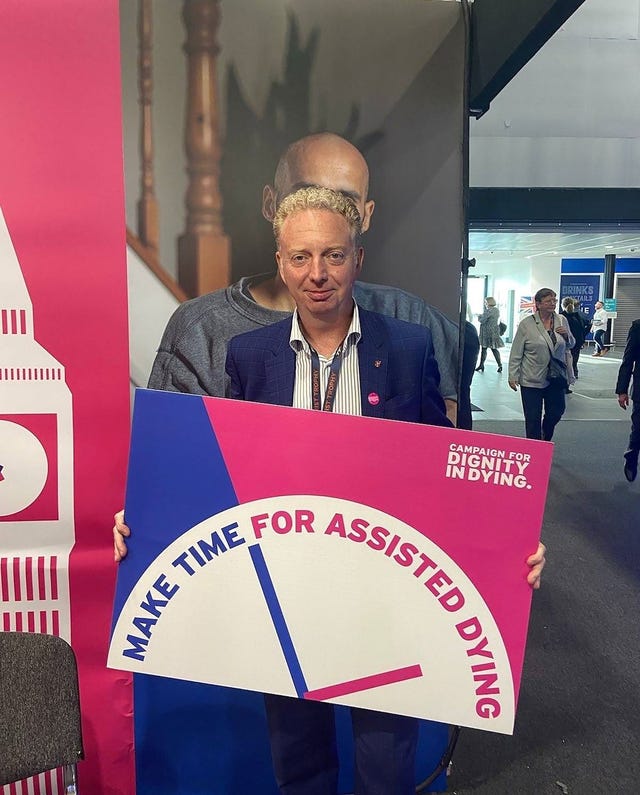Isle of Man takes further step towards legalising assisted dying
The island’s assisted dying Bill will go back to the upper chamber next month from where it could go on to gain royal assent.

Campaigners have hailed a “historic” step on the Isle of Man, as it edged closer to potentially becoming the first part of the British Isles to legalise assisted dying.
The House of Keys voted on various amendments to the assisted dying Bill before sending it back to the upper chamber – known as the legislative council – next month, from where it could be sent for royal assent.
Dr Alex Allinson, the member of the House of Keys (MHK) who introduced the private member’s bill in 2022, has said he is hopeful it can become law later this year and that an assisted dying service could be in place by 2027.
Campaigners opposed to a change in the law have voiced concerns that legalising assisted dying could put pressure on vulnerable people to end their lives for fear of being a burden on others, and argue that the disabled, elderly, sick or depressed could be especially at risk.
As it stands, the Isle of Man Bill is only for adults resident on the island for five years who have a terminal illness with a life expectancy of no more than 12 months, and who have a settled intention to end their life.
Doctors are free to choose whether they want to opt-in to the service, following a previous request from the British Medical Association (BMA) that this should be a choice.
The legislative council had recommended the residency criteria be reduced from five years to one since the person’s diagnosis, but the House of Keys rejected this during the sitting on Tuesday.

The Bill includes a requirement for specific training for healthcare professionals to identify coercion, duress or undue influence, with Dr Allinson saying it has “strengthened safeguards” having faced scrutiny in the various debates since first being introduced.
The House of Keys rejected other amendments on recording the occupation of the witness to the assisted dying application, and for someone to remain present in the room at all times with a dying person, instead suggesting a doctor should be in close proximity.
It is possible the legislative council could disagree with some of the amendments and choose to send the Bill back to the House of Keys.
But Dr Allinson told the PA news agency: “I am hoping we can work with the legislative council to achieve consensus for this to then go on for royal assent hopefully later this year.”
The development on the Isle of Man comes as a committee of MPs resumed line-by-line scrutiny of the Terminally Ill Adults (End of Life) Bill, covering England and Wales, on Tuesday.
An amendment seeking to expand eligibility to people with neurodegenerative diseases who have 12 months left to live – rather than six as the Bill currently states – was debated but not put to a vote.
Liberal Democrat Tom Gordon, said his proposal was “not about opening the floodgates” but about “ensuring equal access”.
Labour MP Naz Shah told the committee the six-month prognosis “was not some minor detail at the Second Reading, rather it was a central plank of the argument made by (the Bill’s supporters).”
The Bill’s proposer Kim Leadbeater said she would not have supported the amendment but credited Mr Gordon for ensuring the voices of those with neurodegenerative conditions “are heard because they are an important part of this debate, whatever our views might be on the tightness that is needed within the Bill”.
The Bill is expected to return to the House of Commons, most likely towards the end of April, for further debate and a vote by all MPs.
In May last year, Jersey’s parliament voted in favour of drawing up laws to establish an assisted dying service on the island for terminally ill people.
After a law has been drafted, a debate could take place by the end of this year, with a likely 18-month implementation period if a law is approved, meaning the earliest for it to come into effect would be summer 2027.
Scotland is also considering separate assisted dying legislation.
Vicky Christian, chair of pro-change group My Death, My Decision on the Isle of Man, said: “This is a historic step, and is likely the last time the Bill will be debated in the lower chamber.
“This Bill will ensure people on the Isle of Man will finally have choice and dignity at the end of their lives.
“I am incredibly proud of our island for not only listening to its people but, more importantly, listening to those facing the end of life. In this debate, compassion and evidence have prevailed.”
Dr Gordon Macdonald, chief executive of Care Not Killing – which is opposed to a change in the law, said: “The current laws prohibiting assisted suicide and euthanasia provide a safeguard against abuse and exploitation and do not need changing.”
He repeated calls for a focus on “fixing the broken palliative care system”.





